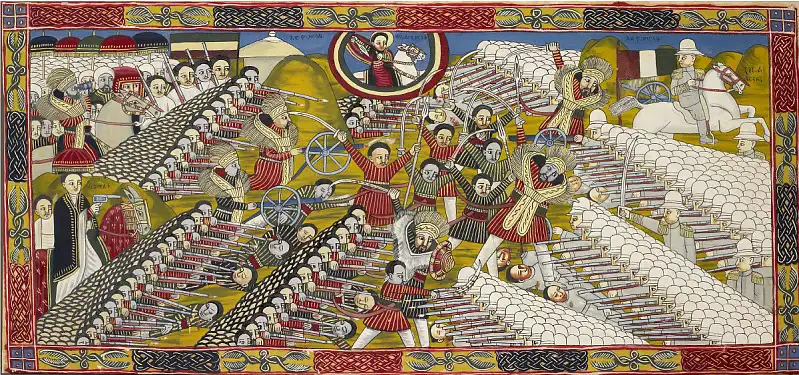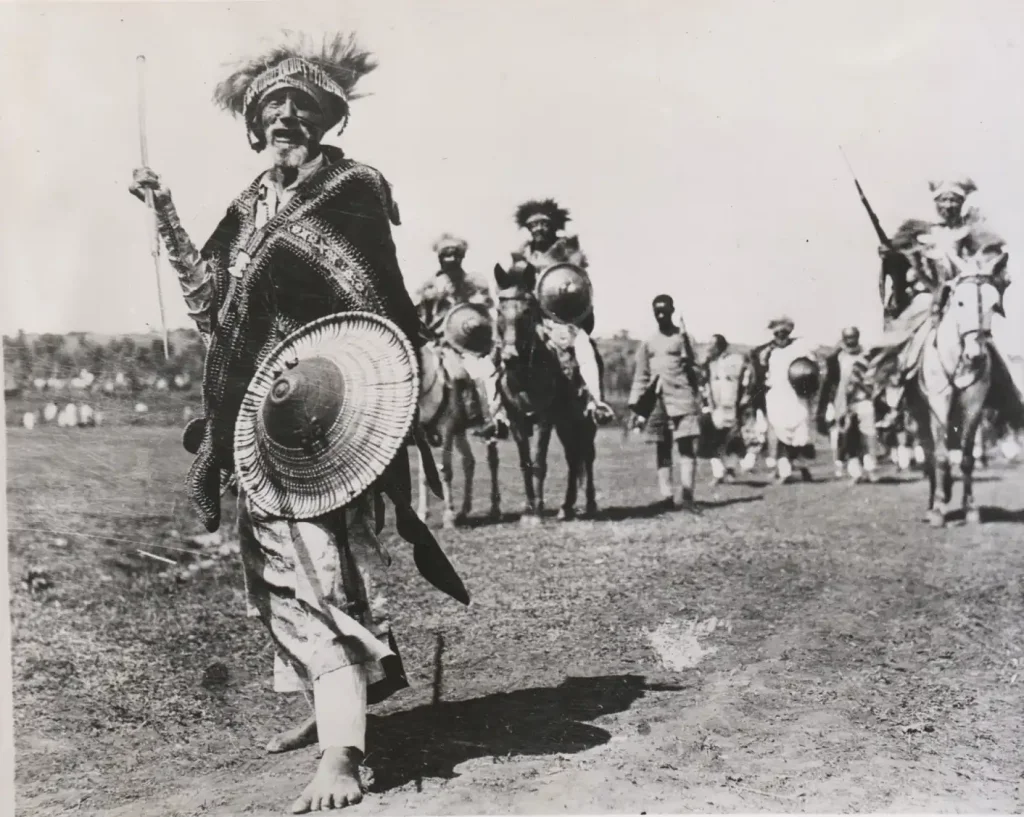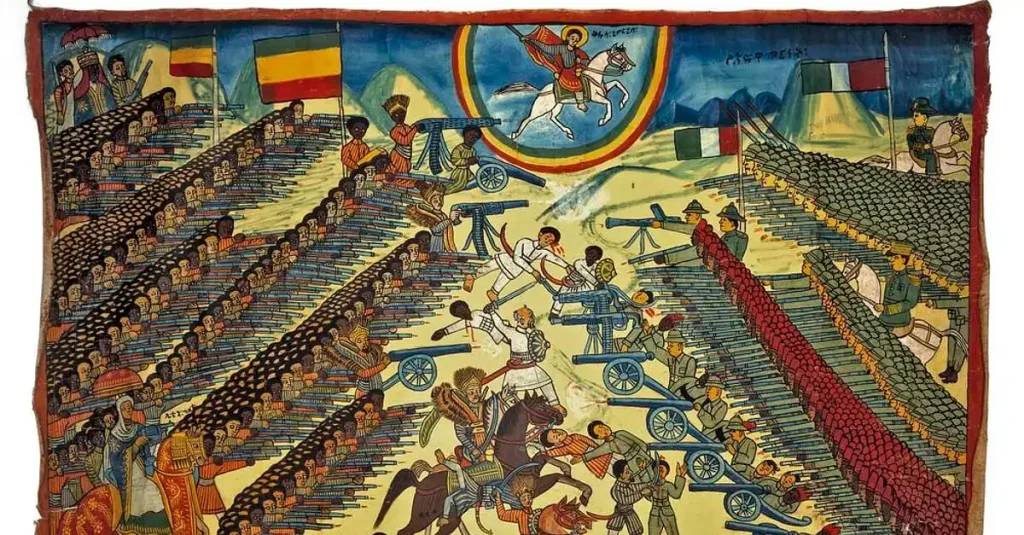The Battle of Adwa is a pivotal event in the history of Ethiopia, marking the country’s victory over the Italian army in 1896. This victory made Ethiopia the first African nation to successfully resist European colonization and inspired other African countries to fight for their independence. In this article, we will delve into the history of the Battle of Adwa and celebrate Ethiopia’s victory over the Italian forces, exploring its significance and legacy.
Ethiopia Before the Battle of Adwa
Before the Battle of Adwa, Ethiopia was ruled by Emperor Menelik II. The country had managed to preserve its independence despite the ambitions of European powers to colonize the region. Ethiopia was a diverse country with several ethnic groups, languages, and religions.

Italy’s Invasion of Ethiopia
In the late 19th century, Italy had ambitions of establishing a colonial presence in Africa. In 1889, Italy signed the Treaty of Wuchale with Emperor Menelik II, which recognized Ethiopia as an independent state. However, the Italian version of the treaty contained a clause that gave Italy control over Ethiopia’s foreign policy. Emperor Menelik II rejected this clause, leading to a diplomatic crisis between the two countries. In 1895, Italy launched an invasion of Ethiopia from its colonies in Eritrea and Somalia.
The Build-up to the Battle
The Italian invasion of Ethiopia led to a series of conflicts between the two countries. Emperor Menelik II formed an alliance with other Ethiopian leaders, and they began to mobilize their forces to resist the Italian invasion. The Ethiopian forces were initially successful in several battles, but the Italian forces managed to capture several Ethiopian territories, including the city of Adwa.

The Battle of Adwa Begins
On March 1, 1896, the Ethiopian forces launched a surprise attack on the Italian forces, who were encamped on the hills overlooking the town of Adwa. The Ethiopian forces, which consisted of around 100,000 soldiers, launched a coordinated attack on the Italian positions. The Italian forces, which consisted of around 17,000 soldiers, were caught off guard and were forced to retreat.
The Battle of Adwa Continues
The Ethiopian forces pursued the retreating Italian troops, inflicting heavy casualties. The Italian forces were ill-equipped and poorly prepared for the harsh terrain and climate of Ethiopia. The Ethiopian forces were armed with spears, swords, and rifles, while the Italian forces were equipped with modern weapons such as machine guns and artillery. However, the Italian forces were unable to effectively use these weapons, and they were quickly overrun by the Ethiopian forces.

The Victory of Ethiopia
The Battle of Adwa lasted for two days, and by the end of it, the Italian forces had suffered a crushing defeat. The Ethiopian forces had managed to capture several Italian generals, including General Oreste Baratieri, and had taken over 3,000 Italian soldiers as prisoners of war. The Ethiopian forces had lost around 4,000 soldiers in the battle.
The Significance of the Battle of Adwa
The victory of Ethiopia in the Battle of Adwa had several significant implications. First, it marked the first time that an African country had successfully defeated a European colonial power. This victory inspired other African nations to resist colonialism and imperialism. Second, the defeat of the Italian forces in the Battle of Adwa had a significant impact on the international community. It challenged the prevailing notion of European superiority and demonstrated the resilience and strength of African nations. Finally, the victory of Ethiopia in the Battle of Adwa was a symbol of national pride and unity. It brought together the various ethnic groups in Ethiopia under a common goal of resisting foreign domination.

The Legacy of the Battle of Adwa
The Battle of Adwa has had a lasting legacy in Ethiopia and beyond. It is celebrated every year on March 1st as a national holiday known as Adwa Victory Day. The victory has been a symbol of Ethiopian pride and unity, and it has inspired the country’s fight against subsequent attempts at colonization and foreign domination.
The Impact of the Battle of Adwa on Africa
The Battle of Adwa had a significant impact on the rest of Africa. It inspired other African nations to resist colonialism and fight for their independence. It challenged the notion of European superiority and showed that African nations were capable of defending themselves against foreign domination.

The Battle of Adwa in the Context of World History
The Battle of Adwa was a significant event in world history. It challenged the prevailing narrative of European superiority and demonstrated the resilience and strength of African nations. It also marked a turning point in the history of European colonization in Africa, inspiring other African nations to fight for their independence.
The Role of Emperor Menelik II in the Battle of Adwa
Emperor Menelik II played a critical role in the Battle of Adwa. He was a skilled military strategist and had managed to unite the various ethnic groups in Ethiopia under a common goal. He also had a vision of a modern Ethiopia that could resist foreign domination and had invested in modernizing the country’s military and infrastructure.

The Contributions of Women in the Battle of Adwa
Women played a significant role in the Battle of Adwa. They participated in various aspects of the war effort, from providing food and water to the soldiers to acting as spies and messengers. Many women also fought alongside the men in battle, demonstrating their bravery and commitment to defending their country.
The Importance of Unity in the Battle of Adwa
One of the key factors that contributed to Ethiopia’s victory in the Battle of Adwa was the unity of its people. The various ethnic groups in Ethiopia came together to resist foreign domination and defend their country. This unity was critical in overcoming the divisions that had previously weakened Ethiopia’s ability to resist foreign aggression.
The Significance of Adwa Victory Day
Adwa Victory Day is a national holiday in Ethiopia that is celebrated every year on March 1st. It is a day to commemorate Ethiopia’s victory over the Italian forces and to celebrate the country’s resilience and strength in the face of foreign aggression. It is also a day to reflect on the importance of unity and to reaffirm Ethiopia’s commitment to defending its independence and sovereignty.
Conclusion
The Battle of Adwa was a significant event in Ethiopian and African history. It marked the first time that an African nation had successfully resisted European colonization and inspired other African nations to fight for their independence. The victory challenged the prevailing notion of European superiority and demonstrated the resilience and strength of African nations. The Battle of Adwa continues to be celebrated in Ethiopia and serves as a symbol of national pride and unity.
